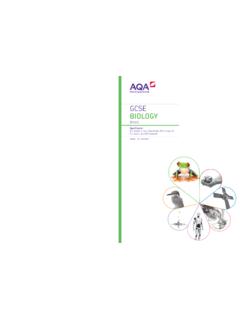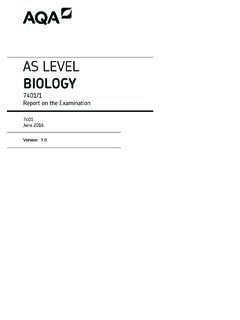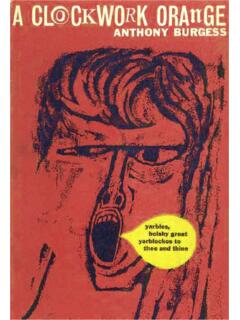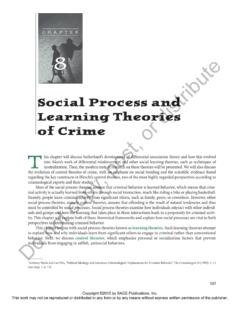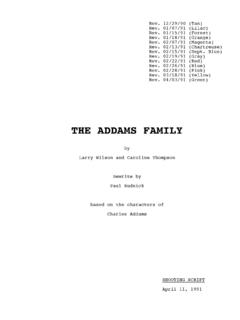Transcription of NEA Independent critical study: Texts across time ...
1 NEA Independent critical study : Texts across time - exemplar response C - Band 5 This resource gives an exemplar student response to a non-exam assessment task, with an accompanying moderator commentary illustrating why the response has been placed within a particular band of the assessment criteria. This resource should be used in conjunction with the accompanying document 'Guidance on non-exam assessment - Independent critical study : Texts across time'. Exemplar student response It has been said that Writers often blur the boundary between the respectable citizen and the criminal.
2 Compare and contrast the presentation of the respectable citizen and the criminal in Great Expectations and A clockwork orange in the light of this view. He is a gentleman, if you please, this villain . Magwitch s words may appear incongruous to a reader whose attitudes toward respectability and criminality are clearly defined, but Dickens Great Expectations and Burgess A clockwork orange each challenge the use of stereotypes. Contemporary, post-war, and Victorian readers would surely all attribute the qualities law-abiding and decent to a respectable citizen, and denounce criminals as lawless threats.
3 However, both novelists, assuming such understanding in their readership, discomfit readers by creating endearing criminals, and presenting a notion of respectability which is either ridiculous or abhorrent. Dickens and Burgess choose to tell bildungsroman stories through first person narrators. Pip and Alex each speak retrospectively, feeding the narratives with their own opinions; however, Pip speaks as a reformed gentleman, condemning from a great distance, whereas Alex never repents, but simply grows up to tell his story affectionately just two years from its beginning.
4 Despite their vastly different narrative perspectives, both characters, at different stages of their journeys, could be deemed either criminal or respectable, in terms of both legality and morality. This not only blurs the boundary between the two, but leaves readers questioning whether a line, or indeed any distinction, truly exists. Great Expectations follows Pip s pursuit of social respectability; he initially confesses, I want to be a gentleman , desiring wealth, education and social standing. However, Pip s struggle is tainted by crime, though Dickens symbolically suggests that Pip chooses the path he takes; when he meets an escaped convict, Pip sees only two black things in all the prospect : a beacon and a gibbet , a guiding light, and an ominous warning.
5 Indeed Grant argues that Philip Pirrip is a palindromic name; things could go either way for him . (Longman, 1984) Ultimately, Pip journeys in a circle to emerge with moral integrity, which Dickens implies to be more wholesome than the narrow Victorian notion of respectability . With criminals, the author punishes any characters that are less than virtuous: Orlick, having killed Mrs. Joe and attempting to kill Pip, is imprisoned following a robbery; Molly, the vengeful murderess, is reduced to a tamed life of servitude; arch-villain Compeyson is drowned while attempting to capture Magwitch; and Bentley Drummle, who beats Estella, dies also.
6 However, those guilty of committing immoral acts, such as Miss Havisham, who orchestrates Pip s life through lies, are often beyond the scope of our sympathy; until she repents we cannot pity her, therefore her decline seems almost deserved. Dickens weaves Pip s journey toward morality into this story filled with crime, rendering criminality and respectability indistinguishable within the novel. Pip s journey, split into distinct stages by the novel s three equal parts, expresses his progression: the first displays a child consumed by criminal guilt; he pursues his expectations through a stage of social respectability (paralleling his moral corruption); finally, he returns to criminality when aiding Magwitch s escape.
7 Pip retraces these experiences without evasion, justification or denial. Such a layered narration, with Dickens manipulating Pip, who influences the reader, may be biased and unreliable, but Pip s eagerness to recount his failures, along with an insistence of internal compassion ( my conscience was not by any means comfortable ), ensures that we are willing to trust his story, and, without moral reprehension, condone his crimes stealing from his sister, and attempting to free Magwitch. Indeed, when Pip is a criminal we respect him the most.
8 For example, as a child Pip is overwhelmed by timorous guilt, stealing somebody else s pork pie , and yet Dickens presents a desperate convict ( soaked with water, and smothered in mud, and lamed by stones, and cut by flints, and stung by nettles, and torn by briars ) whom we cannot begrudge the wittles he forces Pip to steal. The mature narrator conveys this comically, allowing readers to disregard the crime, though the frantic pace portrays the chaotic guilt of a child s mind. Conversely, when Pip is respectable by conventional Victorian standards, he is, ironically, insufferable.
9 The desire for respectability is understandable, and realistically that of an era for, as Faber argues, living people could turn themselves into ladies and gentlemen . (Faber and Faber, 1971) However, Pip s respectability escalates to snobbery: this Dickens condemns. The humble blacksmith Joe, who protects Pip from Mrs. Joe s Ram-pages , and, ironically, rescues him from the debtors prison, is victimised by Pip s moral crimes against human decency. When Joe visits London he naively anticipates what larks they will have, but Pip believes that as a respectable citizen he cannot associate with the common and uneducated Joe, and views the visit with considerable disturbance [and] mortification.
10 During the visit Pip is inhospitable (whereas a true gentleman would have been easier ), allowing Joe to leave without a goodbye. While the middle classes were more contemptuous toward the lower in Victorian England, and some readers may identify with Pip shunning his working-class connections, any humanitarian reader is sure to be abhorred by his actions, especially as the narrator conveys his retrospective shame. Such behaviour is morally repugnant, particularly as Joe is a gentleman within a true Christian gentleman who forgives, rescues, and turns the other cheek.


